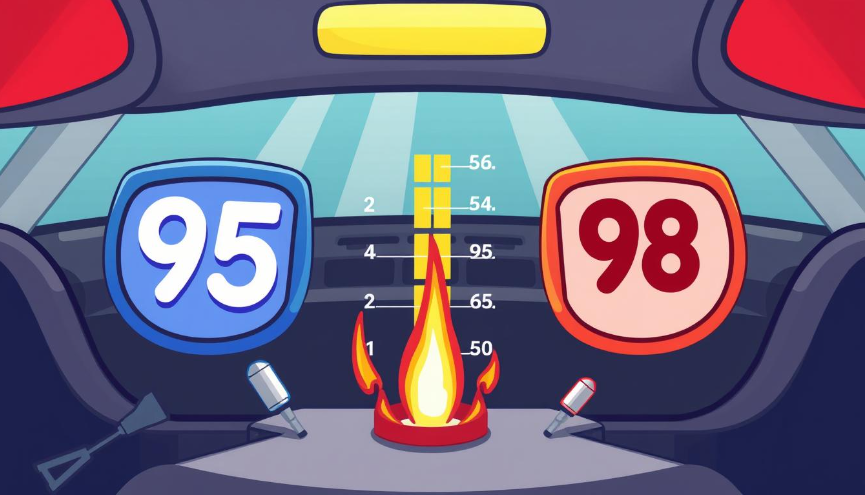When fueling your vehicle, you might wonder about the choice between 95 and 98 octane petrol. What makes these two different, and which is better for your car?
We’ll look into the main differences between 95 and 98 petrol to guide you at the pump.
Contents
Key Takeaways
- The main difference between 95 and 98 petrol is their octane rating
- 98 petrol has higher detonation resistance, suitable for high-performance engines
- 95 petrol is standard for most common cars and generally cheaper
- Mixing 95 and 98 petrol is not recommended
- Choose the petrol grade recommended by your car manufacturer
What Are Octane Ratings?
Octane ratings measure a fuel’s ability to resist “knocking” or “pinging” during combustion. Higher octane fuels, like 98 petrol, have greater resistance to knocking, which is particularly important for high-performance engines.
Comparing 95 and 98 Petrol
| Characteristic | 95 Petrol | 98 Petrol |
|---|---|---|
| Octane Rating | 95 | 98 |
| Detonation Resistance | Moderate | Higher |
| Suitable For | Most common car engines | High-performance engines |
| Price | Generally cheaper | Usually more expensive |
| Fuel Efficiency | Standard | Potentially higher in suitable engines |
95 Petrol: The Standard Choice
95 petrol is the most common fuel type found at petrol stations. It’s suitable for most standard vehicles and offers a good balance between performance and cost.
Key Features:
- Lower octane rating (95 RON)
- Moderate detonation resistance
- Widely available and more affordable
- Suitable for most everyday vehicles
98 Petrol: The High-Performance Option
According to Wiki 98 petrol, also known as premium unleaded, is designed for high-performance engines that require greater detonation resistance.
Key Features:
- Higher octane rating (98 RON)
- Superior detonation resistance
- Ideal for sports cars and high-compression engines
- Can improve performance and efficiency in suitable vehicles
Choosing the Right Fuel
The best petrol for your vehicle depends on its specific engine requirements. Here are some guidelines:
- Check your owner’s manual: Always follow the manufacturer’s recommendation.
- Consider your engine type: High-performance or turbocharged engines may benefit from 98 petrol.
- Evaluate cost vs. benefit: For standard engines, the extra cost of 98 petrol may not justify the minimal performance gains.
Can You Mix 95 and 98 Petrol?
Mixing 95 and 98 petrol is not recommended. According to automotive experts, using mixed octane fuels can lead to:
- Inconsistent engine performance
- Potential damage to engine components
- Reduced fuel efficiency
- Possible voiding of vehicle warranty
Always use the petrol grade recommended by your car manufacturer to ensure optimal performance and longevity of your engine.
Conclusion
While 98 petrol offers higher octane and better detonation resistance, it’s not necessarily the best choice for every vehicle. Most standard cars run perfectly well on 95 petrol, which is also more cost-effective.
High-performance vehicles, however, may require or benefit from the higher octane 98 petrol. Always consult your vehicle’s manual or a trusted mechanic to determine the most suitable fuel for your specific car model.

Hi, I’m Sufiyan, the developer behind this platform. I created FuelConsumptionCalculator.com to simplify fuel tracking for everyone — because understanding your vehicle shouldn’t require a degree in mechanics. I’m always working on adding more tools and content to make this site even more useful

